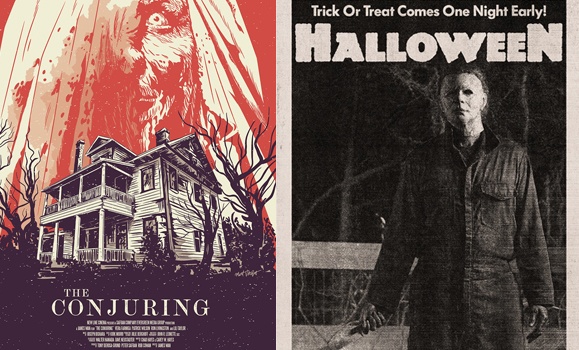The end of October has arrived and with it comes the spookiest holiday of all: Halloween.
Once associated with the start of winter (a season many associated with death), Halloween is now better known as the time of year when people dress up in all kinds of costumes, go trick-or-treating and watch scary movies.
Ìý
Indeed, horror movies have become a staple of the Halloween spirit. And it’s not just old favourites like The Shining or Halloween — modern films such as 2013’s The Conjuring and 1996’s Scream have risen to the status of Halloween classics, perfect to be paired with a cozy bed and a dark room.
While one might think that a liking for horror movies is simply about preference, there is in fact a lot of science behind it.
Simon Sherry, a Dal professor and director of clinical training in the Department of Psychology and Neuroscience, offers interesting insight into the psychology of fear and horror movies. Dr. Sherry's work in research, as well as clinical practice, revolves around understanding people's personalities and treating disorders that patients have, including fear-like anxiety disorders.
Fear and frights
Fear, as an emotion, acts as a stimulus for the brain. "Fear activates your body's sympathetic nervous system, which we know as the ‘flight or fight’ system," explains Dr. Sherry. With regards to fear, the stimulus that activates the sympathetic nervous system yields a very "alarm-like" activation, he adds. A response to fear can yield different emotional reactions and physical reactions, depending on the person.
"One personality type that loves fear experiences and horror movies are sensation seekers," says Dr. Sherry. This is due to a concept known as cerebral hypo-activity, where the brain is under-stimulated and causes sensation seekers to seek out varied, risky sensations that will invoke an extreme stimulus to the brain. This is similar to thrill seekers, who are also cerebral hypoactive and look for risky experiences.
Another difference that contributes to enjoying horror movies is psychopathy, says Dr. Sherry. Psychopathy is a disorder linked to traits such as persistent antisocial behaviour, self-centredness, and a lack of empathy or remorse. It is often misunderstood, leading people think of the extremes of psychopathy. In fact, most people have some traits related to psychopathy, but they just tend to be less pronounced or persistent than in extreme cases. People with psychopathic traits may have a lack of fear and have a diminished startle response than others — and it helps explain why some individuals actually enjoy fear.
A wide range of reactions
Some people may love horror movies — but others are terrified of them. At the extreme end, Dr. Sherry attributes this to people with neuroticism. Neuroticism is the dispositional tendency to experience intense negative emotions. He says this tendency can cause a fear stimulus to be heightened and can provoke a stronger reaction towards the stimulus.
Repeated exposure to tasks that provoke fear in a person can eventually lead to the person habituating them or getting used to them, says Dr. Sherry. "This concept is currently being used to treat victims of car accidents who are afraid of entering vehicles," he says, adding that, "over time we see that the victims can slowly get used to the notion of being in a vehicle."
Whether you have a fear for horror movies or absolutely love them, Halloween is prime time to tune in and get spooked.

